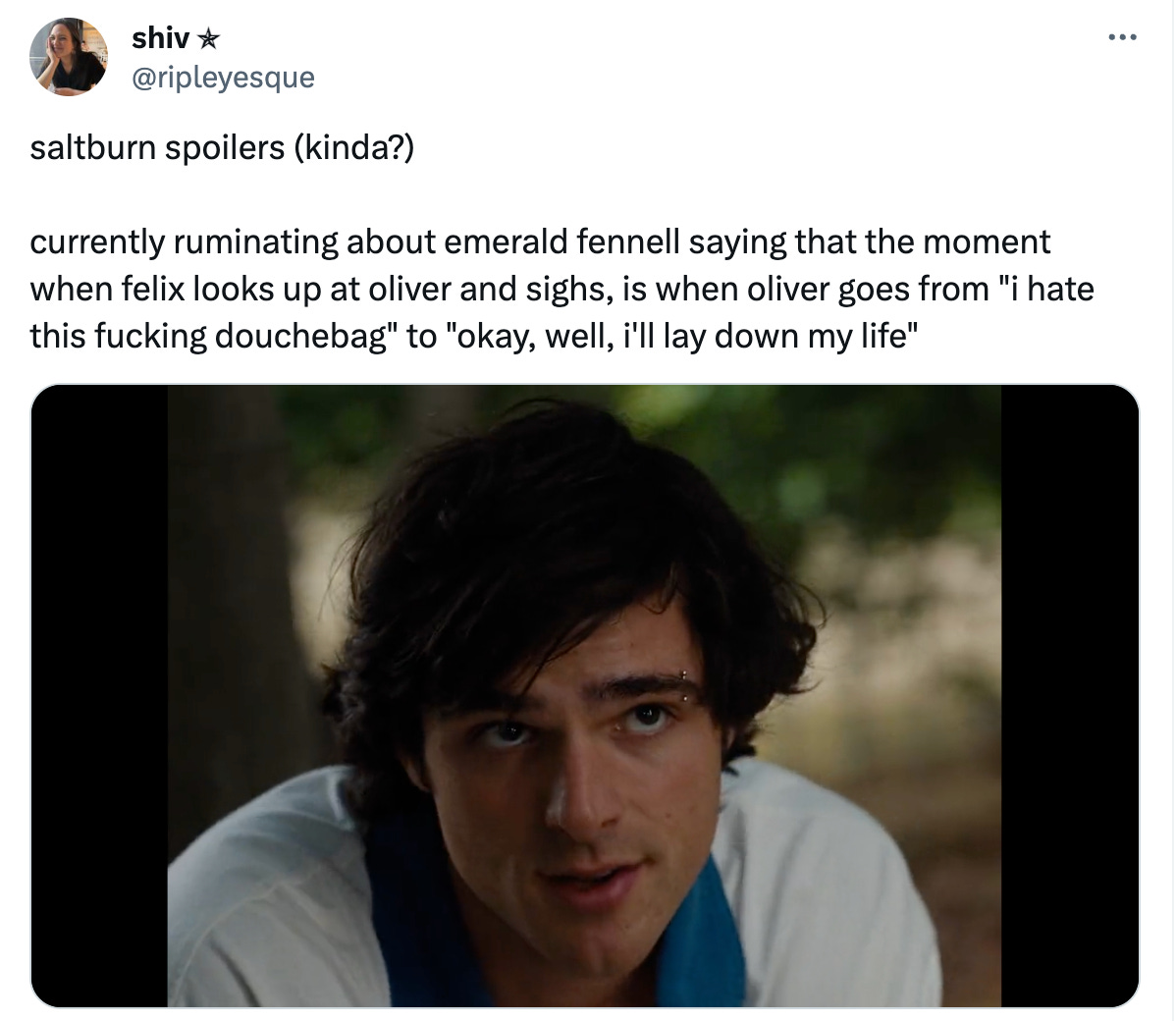Gabrielle #1 – Skins Revisited
Digesting Saltburn, a 00s period drama that should have been an erotic thriller but for some reason isn't.
My motivations for rushing to see Saltburn were much the same as everybody else's. I’m a simple woman. I, too, saw the still of Jacob Elordi with an eyebrow piercing and thought: yes, Picturehouse Central, please suck me £18.50 dry on a Friday night. I, too, read the sentence “I was very proud to have Barry Keoghan guzzling it like that” and thought: at last, a film encouraging tonally appropriate conversations about cum. I also figured it would be worth seeing because the response has been starkly divided, which is the sign of an interesting film if not a good one.
Naturally, because it’s sexually explicit and to do with class, the discourse has been insufferable. Right off the bat I’ll say that if you’re expecting razor-sharp class analysis from someone called Emerald Fennell, that’s on you. I also suspected the sex scenes wouldn’t be anywhere near as “shocking” or “provoking” as some reviews claimed they were, and I was right, but not for the reasons I was expecting.
Despite the fact that she talks like a character off Brass Eye, I rate Emerald Fennell. I like how she plucks subject matter out of ‘the discourse’ that should be – or rather, that we demand is – handled with absolute solemnity, and uses it to make something deliberately kind of stupid. She does it with sexual violence in Promising Young Woman, with uniquely female acts of malevolence (destroying a stranger’s life from a distance and so on) in her short Careful How You Go, and with the British aristocracy in Saltburn. At a time when we overwhelmingly interpret media through a binary political lens – is this right or wrong? Does your take on it make you a good person or bad person? – Fennell has always worked in the grey spaces of morality.
That’s what I enjoyed about Promising Young Woman, a film I haven’t seen in a while but batted for when it came out. To me it felt spiritually aligned with Scream: a pulpy satire that tackles its subject matter sideways. Scream mocking the sinister slut-must-die-first tropes of slashers and moral panics about violent entertainment making violent teenagers; Promising Young Woman skewering rape culture from the perspective of a murderous vigilante who’s decided to deal with it herself, like Rorschach in card shop a ‘sexy nurse’ outfit. The film doesn’t feel the need to explain itself, or explicitly condemn anything. It makes its own rules, creating a level(ish) playing field in which anyone’s life is fair game for ruin and the characters can come off the leash – the hyperbole of their actions jarring against the stark reality of the subject matter. That used to be more common in mainstream entertainment (cue Patrick Bateman howling “try getting a reservation at Dorsia now, you fucking stupid bastard!” as he hacks his colleague to bits to Huey Lewis and the News), but we see it less now that societal violence has been flattened into academic terms on social media. When it shows up as satire it's less shocking, but also more contentious.
Honestly, half the credit I give Fennell is down to the fact that she managed to write a laugh out loud joke into a femicide scene in 2020, the year you couldn’t open a newspaper without seeing the words “fatally choked during sex.” I respect that, and I think it worked because of how well the insecure, pornsick breed of frat house masculinity was caricatured by Al and Joe: two douchebags who answer the question ‘what if the guys in American Pie grew up and got jobs in fintech.’ In the scene, Al is handcuffed to a bed next to the corpse of our anti-hero, who he smothered to death with a pillow the night before. Joe does the brotherly thing and insists that it wasn’t his fault, and Al whimpers: “I dunno man… it kind of seems like it is!”
That, to me, is sublime. It’s giving worm. It’s giving Matthew Lillard at the end of Scream crying “my mom and dad are gonna be so mad at me!” when he realises he’s about to be arrested for multiple murders, as if he’s thrown a house party that got out of hand. It’s funny because it’s so horrible, and it’s made more horrible by the fact that it’s so funny, which makes the scene ten times more effective than it would be if it were played straight. We don’t see them as villains here, we see them how they see themselves: as victims. Same with the Cattons in Saltburn.
There’s a high-brow, low-brow thing going on with Fennell’s films, which defuse thorny cultural talking points with flippant humour and post-ironic engagement with pop culture (especially music). That’s partly why they provoke such wildly different reactions. Some see them as tasteless, or less worthy. Humour often has that effect in an artistic context. It makes people angry. A lot of people wanted Saltburn to be meatier, like that would justify its setting: Oxford University circa 2006 and a Grade I listed country house occupied, in real life, by the Sackvilles – a family the Daily Mail once summarised as “rotten, but they had a room for every day of the year.”
Much like its characters, Saltburn isn’t concerned with meaning. It’s concerned with frivolity to a fault. It’s a surface-level story of obsession on par with a bodice-ripper your mam would read in the bath. It’s Skins as a period drama. Brideshead Revisited for the American Apparel disco pants era. That’s not to say it isn’t smart or funny. Rosamund Pike’s character, Lady Elspeth Catton – a delusional former model who coos over other people’s trauma like a mad pigeon while referring to her daughter’s eating disorder as “fingers for pudding” – is as well observed as any of the cunts on Succession. Beyond that it’s mostly vibes. A series of jokes about the landed gentry strung together by camp, mid-00s aesthetics designed to give millennials flashbacks to buying three VKs for £5 at a club called Something Bar & Grill.
Saltburn spoilers contained from here on. Maybe return to this another time if you’ve not seen it and wish to enter the experience pure of opinion.
To briefly summarise the plot: a Yorkshire lad called Oliver Quick (Barry Keoghan, who’s had the role of ‘little fucking freak’ in a headlock since The Killing of a Sacred Deer) starts at Oxford and struggles to fit in. He develops a parasocial obsession with aristocratic golden boy Felix Catton (Jacob Elordi, for our sins), who is endeared to him thanks to an incident involving a flat bike tyre. They strike up a friendship, it’s revealed that Oliver isn’t who he says he is, chaos ensues.
I felt sick throughout much of the first half. Not because of the sex or the one weirdly long shot of a sink plastered in spew, but because of Keoghan’s agonising portrayal of someone on the outside looking in. It’s a shrinking, pathetic feeling. One I think would have driven me psychotic if I’d ended up somewhere like Oxford instead of an arts college that was proudly celebrating two years of university status and mostly attracted the kind of people who took a gap year to drop acid and work in a chip shop.
Anyway, apart from that feeling of rejection early on there’s little emotional substance to Saltburn. Fennell’s not drawing on any larger-than-life generational fantasies, spiritual maladies or collective experiences beyond doing Jägerbombs and wearing Kate Moss for Topshop. It’s a cold, calculated watch about a cold, calculated England. It’s a good movie, but it’s not a great film. And it’s annoying because it could have been if it were a straight up homoerotic thriller, which it pretends to be until the last minute for reasons I can only assume were the result of a stroke.
Forget the argument about whether posh people can make class satire (don’t be dumb, it’s historically the one thing they’re good at). Forget the nit-picking over the fact that it’s set in 2006 but they’re doing “Low” on karaoke and watching Superbad. The real issue with Saltburn is that it leads us down a path of twisted submission only to reveal that Oliver is a serial killer, which renders any sexual dimension almost completely irrelevant.
At a push, there might be a point in there about ruling class hubris. How their view of anyone ‘lower’ is so narcissistic and patronising they simply do not perceive a fellow person; can’t fathom Oliver as an individual with talents and motivations, let alone the capacity to put one over on them, and so they deserve what they get. But that’s being generous. It definitely means to take “eat the rich” to its most absurd conclusion, which it does if your translation of “eat the rich” is “stand aside so that I, a financially comfortable psychopath from Merseyside, can assume the titular estate.” Relatedly I will say the first twist – Oliver being exposed as a middle-class brat whose parents are wonderfully supportive – is a really funny thing to do with this particular film, which inevitably prompts furious discussions of class warfare despite the total absence of working class characters. Leftist podcast community found reeling!
Ultimately all that is fucking boring compared to the cocktail of lust between Oliver and Felix. That slippery slope of hating someone out of envy and then coveting them for the same reasons because they looked at you once. The thrill of them taking an interest in you. The dizzying ouroboros of wanting them and wanting to be them, and getting closer and closer to the centre of their world until you have no other recourse but to physically enter them and, eventually, become them. It’s a shame that tension is abandoned, considering it’s the entire marketing strategy. The logical ending of Saltburn would have had Oliver replace Felix in the family unit, which remains otherwise undisrupted. Better yet, the erotic ending would have had Oliver pick off Felix’s relatives until he’s isolated, in the hope that’ll lead to them being together, and then end up killing him out of desperation when it backfires. The arse falls out of the film when it becomes more about the desire for something, rather than someone.
I do wonder whether we, as a culture, would be able to process that version of the film. Some people in the cinema full belly-laughed during moments I really don’t think we’re meant to be funny, like when Oliver fucks Felix’s grave after the funeral. It’s tragicomic, but… haha? LOL? The sound supervisor has literally said that the scene is deliberately muted so the audience can be in communion with Oliver, “experiencing [his] raw emotion.” I thought it was sad. I’ve personally done some insane things in moments of grief, though I suppose the joke’s on me because it turns out Oliver is mental. I had a similarly jarring experience watching Priscilla, where there were a lot of laughs at points that were meant to demonstrate Elvis’ private turmoil – flashes of insecurity, the famously dark and opulent decor of his bedroom.
We’ve lost touch with the erotic, is what I’m saying. There are a lot of awkward people in the world who will laugh at nudity because they don’t know what else to do with it, but if people laughed during moments in Saltburn that were meant to be real then, to be honest, it’s the film’s fault. Things are only made erotic by a conflict beneath the surface – sadness, pain, shame, any kind of complex psychological feeling. That’s what made Infinity Pool so compelling. Mia Goth waving a gun at Alexander Skarsgård while he walks barefoot in front of her car and she drunkenly berates his novel is more erotic than Saltburn’s 127 minutes combined.
Without subtext, there’s just sex, and sex on its own doesn’t mean much of anything. As one review said of Saltburn: “Here is a movie where gay things occur.” Like, why bother showing Oliver slurping up Felix’s cummy bath water and rimming the plughole, or eating out Venetia on her period and trying to assume control of her food, or shagging a fresh mound of dirt burying the guy he’s spent six months leering at if this isn’t an erotic film at heart? Why, after all that, are we left with Oliver absolutely buzzing because he’s got a big house? Good old fashioned sadism, I guess, but god… how boring.
The only truly hot thing about Saltburn is the way Jacob Elordi is shot. The camera lingers on him covertly, like how you think you’re getting away with eyeing people up in the summer because you’ve got sunglasses on. Like an object. Like a young Leonardo DiCaprio. It obviously helps that he’s fall-to-your-knees-and-suck-it-from-behind gorgeous, but he’s also one of those rare male actors who’s built to be eaten alive by the audience. We want him, we need him, and so he must die – repeatedly. As Felix, as Elvis, as a piano teacher/secret lover in Adrian Lyne’s 2022 psychological thriller Deep Water, and as Nate in Euphoria if Sam Levinson has any sense left.
That’s erotic.









Really enjoyed this piece, especially as my other post-watch media thing from my favourite podcast turned out to be one long 'it had some qualities but we hated it', lol.
I enjoyed the film too! I don't know if I've made this up in my head, but I feel like there is a fun double entendre with
1. Oliver's simultaneous hatred and love of Felix (which feels like a metaphor for our relationship with the hyperrich in the instagram, 73 questions with vogue era), and
2. Felix's appreciation for Oliver clearly being tied to admiration for Oliver's suffering, a performance that 'just gave you what you wanted' (which was a great premonition for some journalists have judged the film, including one insane take that Fennell should have given Keoghan a role that pays respect to his working class heritage?!?!?).
Like maybe the film accidentally says something about the messy, paradoxical ways that the classes percieve eachother in this messed up country.